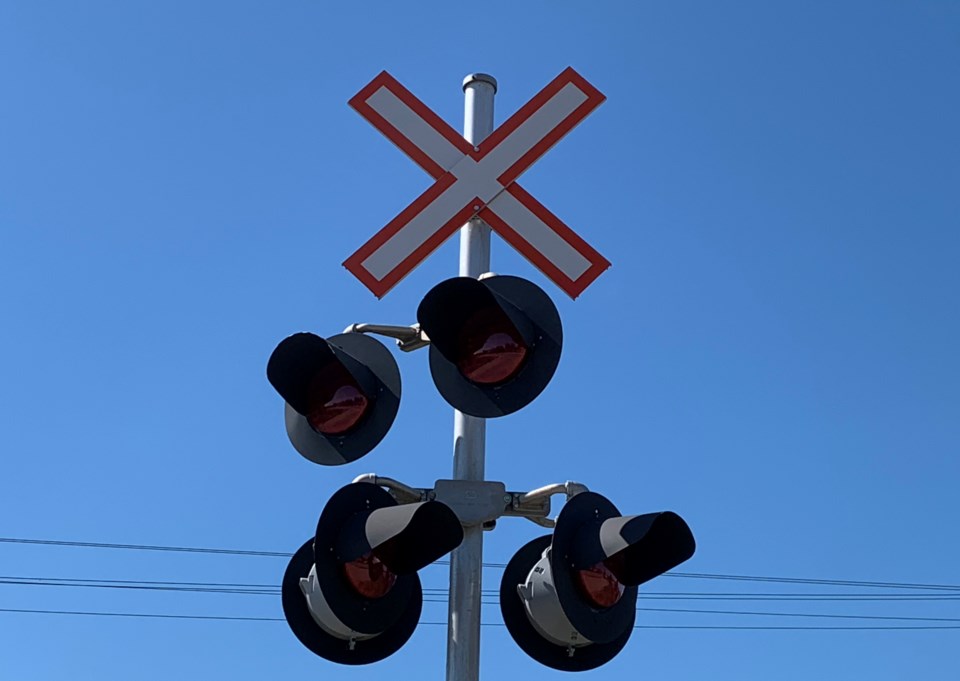Renewed efforts by residents to muffle whistles as trains come through Aurora have received a thumbs-down from municipal staff.
This week at the committee level, council will consider a recommendation from town staff to put the latest attempts at whistle cessation on ice.
Aurora has four level crossings at Engelhard Drive, Wellington Street East, Centre Street and St. John’s Sideroad, requiring GO Train conductors to sound the horn upon approach and, in the case of Wellington Street East, upon departure towards Centre Street.
In order for a whistle cessation program to take root, the town would have to invest in several at-track upgrades for pedestrian safety. This has been a sticking point in previous attempts to bring in an anti-whistle program and this latest round is no exception.
In a report to council, municipal traffic analyst Michael Bat said York Region and the Association of Municipalities of Ontario (AMO) have renewed a number of concerns first put forward in 2019 recommending against a program.
These include: “considerable construction costs to meet the Transport Canada safety requirements, including the installation of the following elements at a minimum: maze barriers or pedestrian warning gates, flashing lights to assist the public who have hearing impairments, tactile walking plates to assist the public who are visually impaired, signage, and audible markers; the municipality must undertake the mandatory Safety Assessment to be completed by Metrolinx’s Third Party Project consultant at the municipality’s expense; the liability and risk will be shifted from the railway authority to the municipality in the event of an incident as a result of the program; many municipalities that have initiated the process have found the mandatory safety assessments and required upgrades to be costly; the process can take up to five years from the project initiation to completion; and the program is only intended to eliminate the whistles and not necessarily other sounds created by the train, including noise caused by the wheels at a low speed and/or engine vibrations.”
Bat noted that while the City of Markham implemented an anti-whistling program in November 2019, Markham did not respond to Aurora’s request for feedback on their system. Other communities, such as Richmond Hill, Newmarket, East Gwillimbury, and Caledon, Bat notes, opted not to proceed with anti-whistle programs for “concerns related to public safety.”
“Halton Region recently passed a motion on May 19, 2021 to prohibit all whistling at the Trafalgar Road railway crossing between Lindsay Court and 20 Side Road in the Town of Halton Hills,” said Mr. Bat. “In a staff report prepared for the Town of Halton Hills Council on May 28, 2021, it is recommended that whistle cessation not be implemented at the railway crossings on roads under the jurisdiction of the Town of Halton Hills.
“[The Town of Aurora’s] Insurer has advised that there would not be an additional premium charged if an anti-whistling bylaw was enacted by Council. However, if the town was to suffer a catastrophic loss and it was shown, in whole or in part, that the cause of the loss was as a direct result from a train not sounding its whistle because of an anti-whistling bylaw in effect, the town’s insurance program would be negatively impacted. In addition, as more municipalities are considering enacting anti-whistling bylaws, municipal insurers may increase premiums for all municipalities due to higher exposure or risk since eliminating train whistles may increase both the frequency and severity of accidents. It is difficult to determine how many incidents have arisen as a result of the elimination of train whistles as most cases are settled quickly and without going to court.”
Council this week, or by the time any decision is implemented by April 26, could go against staff’s direction and proceed with the program.
Should they do so, completing the necessary design and construction work on required pedestrian safety measures – including maze barriers at Engelhard and Centre, and four pedestrian gates at St. John’s Sideroad, could cost nearly $1,198,000.
“This estimated cost excludes all ongoing program operating costs such as those relating to required annual monitoring, inspection and repair of the required infrastructure, plus any potential insurance premium increases,” said Bat. “As noted previously, these costs are expected to be material and would result in a new tax levy pressure that would need to be managed by the town."
Brock Weir is a federally funded Local Journalism Initiative reporter at The Auroran

